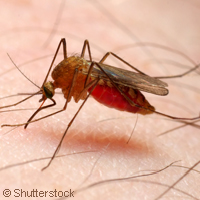Effectiveness of malaria drug varies throughout Africa
An international study of malaria led by researchers in the UK shows that the effectiveness of the widely used anti-malaria drug sulfadoxine may vary widely across Africa because malaria parasites in different parts of the continent have developed different resistance mutations to the drug. The results of the study, published in the online journal PLoS Medicine, have led experts to call for greater coordination in anti-malaria campaigns across Africa, as coordinating programmes in areas where malaria parasites have similar patterns of drug resistance will be far more effective than doing so when researchers work alone in different areas. The plasmodium falciparum parasite, which is carried by mosquitoes and causes malaria, is responsible for nearly one million deaths a year in sub-Saharan Africa. Until recently, patients were usually treated with the drugs chloroquine and sulfadoxine-pyrimethamine; however, both of these are now being undermined by growing resistance as the mosquito parasites mutate. Scientists have discovered that resistance to chloroquine and pyrimethamine began in the 1970s and 1980s in Asia and spread across Africa. However, the mutations that are causing resistance to sulfadoxine only emerged in the 1990s and have not yet totally spread across the continent. The researchers used genetic analyses to determine how sulfadoxine resistance is spreading. The aim was to determine the geographic origins of the drug-resistant parasites. The team analysed blood samples that were collected from malaria patients in Africa. They found five major genetic sequences, each with a unique geographic distribution. They also discovered that malaria parasites had a different molecular basis for sulfadoxine resistance and different resistance patterns in east and west Africa. Discovering the different forms of resistance was particularly important, as it showed why the effectiveness of sulfadoxine varies across Africa. The researchers also investigated the emergence of parasite resistance to sulfadoxine in different regions of Africa and found that internal patterns of immigration and transportation may have something to do with the emergence of different strains of sulfadoxine-resistant parasites in different areas. Lead investigator Dr Cally Roper of the London School of Hygiene and Tropical Medicine in the UK said, 'Our findings suggest that the effectiveness of sulfadoxine as an anti-malarial drug may vary across Africa. They also point to the need to coordinate malaria control campaigns across socioeconomically lined areas in Africa rather than focusing solely on national territories, in order to more effectively reduce the malaria burden in the continent.'
Countries
United Kingdom



